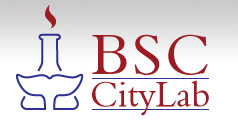 |
||||
|
||||
 |
||
| Home > Modules > Whale of a Mystery | ||
Whale of a Mystery |
||
|
The Whale of a Mystery curriculum has been developed and offered by the CityLab staff at Bridgewater State University as a week-long summer program for middle school students. Many of its core activities have been adapted as a thematic curriculum supplement. The module follows a "progression of inquiry" model and is based on forensic studies that use protein fingerprinting techniques. Educators are encouraged to adapt and use the materials, either as a whole or as stand-alone lessons, for classroom, camp, or club settings. Overview Faculty of the BSU Biology, Chemistry and English departments developed the Whale of a Mystery summer offering in 2001 through a grant from the National Institutes of Health (NIH). Since then, more than 400 middle school students (entering grades 6 through 9) have participated in the program. The curriculum teaches a range of life science concepts through role-playing in a fictional setting with a fast-paced scenario. The interdisciplinary nature of the content and the emphasis on group work help make Whale of a Mystery a strong academic opportunity in a relaxed atmosphere. Students in each one-week session are exposed to science professionals, an array of laboratory instruments and equipment, the college campus, a whale watch, and important social interactions with other like-minded students, both younger and older. The program builds on a scenario in which the students are “new hires” at the imaginary Bridgewater Animal Forensics Laboratory (BAFL). They have completed their orientation and have begun basic training in the use of micropipettes when, suddenly, the phone rings. An urgent case has arrived at the laboratory and the “student scientists” are quickly pressed into action. An undercover field agent has shipped to BAFL several samples of meat purchased at foreign fish markets. Every year, endangered or protected species of Cetaceans (whales and dolphins) are hunted and their meat illegally sold in foreign fish markets (based on actual cases reported to the International Whaling Commission). The agent suspects that some of the filets may indeed be from endangered whales but needs the BAFL team to make a positive determination about the species. The student scientists must first figure out what type of tissue samples have arrived in the ice-packed coolers, since the labels have become wet and illegible. A lesson on gross anatomy and another session on histology enable the students to identify which samples consist of muscle tissue. After extracting protein from the muscle, students must complete a quantification assay to be sure they have the optimal amount. Finally, they are ready to perform polyacrylamide gel electrophoresis on the protein samples. The resulting protein fingerprint is species-specific and can be compared to other protein fingerprints in BAFL’s database. The students discover that the filets sent by the field agent really are whale meat, and some of them are from internationally protected species. They crack the case, but not before they encounter several twists and turns in their investigation, including a subpoena to testify before a mock congressional hearing on endangered animals. (The reader should note that these “whale meat” samples are actually a variety of commercially available fish in disguise!) The Whale of a Mystery module introduces students to protocols and equipment used in real biotechnology research laboratories including micropipettes, microscopes, water baths, spectrophotometers, microcentrifuges, and vertical gel boxes. Students learn basic concepts about scientific measurement, DNA, protein synthesis, cell biology, histology, physiology, and endangered species. Taking full advantage of the marine mammal “hook,” the curriculum is interdisciplinary, aligned with many of the state’s middle school science standards, and includes a significant language arts component. Teams of students engage in research about Humpback, Minke and other local whale species and populations. They write copy and create visual presentations based on their lab work and research, and they must defend their results orally when called upon as expert witnesses at the mock congressional hearing. The Whale of a Mystery module has been offered several times as a 3-credit graduate course for middle school teachers. The participating teachers have helped the BSU CityLab staff refine the methods and protocols during the summer classes and have incorporated parts of the module in their classrooms throughout the school year. In addition, the module has been field tested at the middle school level by a team of educators at the Atlantis Charter School in Fall River, MA, Hastings Middle School in Fairhaven, MA and Gilmore Academy in Brockton, MA. The BSU CityLab staff is ever grateful for their help.
|
||


